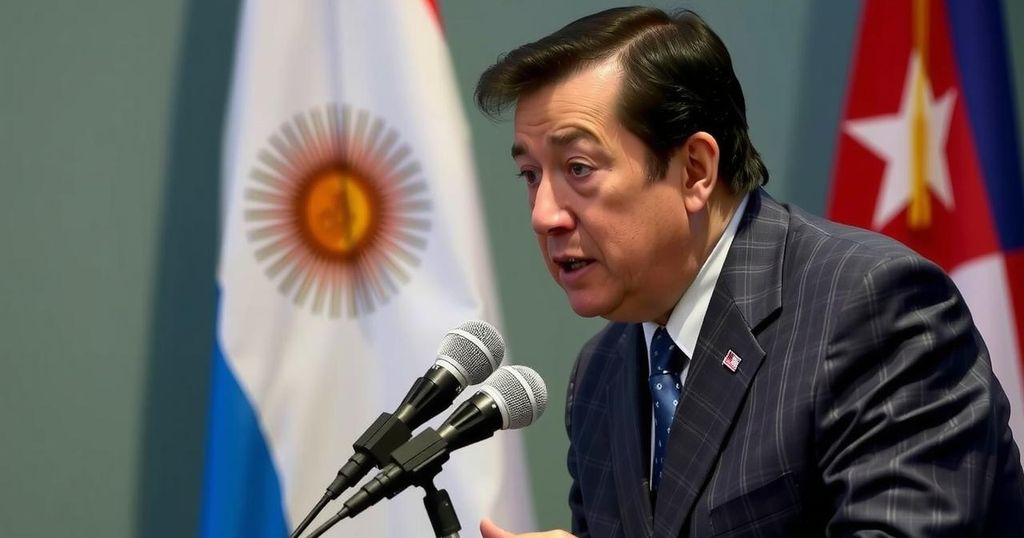Argentina’s President Javier Milei has dismissed Foreign Minister Diana Mondino after the nation voted in favor of lifting the U.S. embargo on Cuba at the UN. Milei appointed Gerardo Werthein as her replacement, emphasizing a stern opposition to the Cuban regime and a shift in foreign policy aligning with Western democratic values.
In a notable shift in Argentina’s international stance, President Javier Milei dismissed his foreign minister, Diana Mondino, following the country’s support for a United Nations resolution advocating the lifting of the United States economic embargo on Cuba. On Wednesday, Argentina was among 187 nations that voted in favor of the non-binding resolution, with only the United States and Israel opposing it. This decision marked the first departure from alignment with U.S. and Israeli policies since Milei took office. Milei appointed Gerardo Werthein, the ambassador to Washington, as Mondino’s successor. The President’s office subsequently asserted that Argentina remained “categorically opposed to the Cuban dictatorship.” This stance represents a significant pivot from the previous leftist Peronist administration, which maintained a relationship with Cuba and supported the removal of the long-standing embargo that traces back to the 1960s, instituted during Fidel Castro’s communist revolution. Historically, Cuba has expressed solidarity with Argentina concerning its claims over the Falkland Islands, a territory contested with Britain, especially during the conflict in 1982. As Milei continues to reshape the country’s foreign policy, a statement from his office articulated the vision guiding these changes. It emphasized the need for Argentina’s diplomatic efforts to reflect principles of freedom, sovereignty, and individual rights, which the statement believes are fundamental to Western democracies. Furthermore, it reinforced the country’s unwavering position against regimes that engage in human rights violations. Increasing tensions had become apparent between Milei and the foreign ministry, with Mondino previously playing a crucial role in managing Argentina’s image abroad amid the administration’s more confrontational diplomatic posture. The historical context of the U.S. embargo, instituted in 1962 to counteract Castro’s socialist government, has been a longstanding point of contention within the region and beyond, yet it has not succeeded in altering Cuba’s political landscape.
The United States first established the economic embargo against Cuba in 1962 in response to the communist revolution spearheaded by Fidel Castro. This embargo aimed to coerce Cuba into abandoning its socialist policies in favor of capitalism and democracy. However, it has been widely criticized for failing to achieve this goal, becoming a contentious issue between the U.S. and its neighbors in Latin America. Under the prior left-wing Peronist administration, Argentina maintained amicable relations with Cuba, advocating for the embargo’s end and benefiting from Cuba’s support on issues such as the Falkland Islands dispute with Britain. Javier Milei’s recent actions signal a dramatic departure from this approach, aligning more closely with contemporary conservative views on governance and human rights.
In summary, President Javier Milei’s dismissal of Foreign Minister Diana Mondino underscores a pivotal change in Argentina’s foreign policy towards Cuba and its relationship with the United States. This realignment reflects a broader commitment to democratic values and a departure from the previous administration’s approach, indicating a new era in Argentina’s international relations.
Original Source: www.bbc.com







